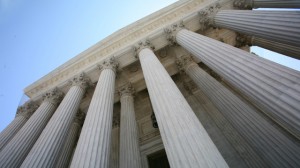Last week, The Wire creator David Simon told Bill Moyers that the legal doctrine that spending money on political campaigns is an act of political speech protected by the First Amendment poses the greatest threat to American democracy. “That to me was the nail in the coffin,” he said. “If the combination of the monetization of our elections and gerrymandering create a bicameral legislature that doesn’t in any way reflect the will of the American people, you’ve reached the end game for democracy.”
He’s right. Not only does money as speech allow those with the fattest wallets to drown out the voices of average citizens, as John Light points out, it also gives wealthy donors an effective veto over policies that enjoy majority support. But it’s important to understand the other ways that the expansion of civil rights for corporations can conflict with the public interest.
As Simon observed, the notion of corporate personhood isn’t inherently problematic. The concept that companies are “artificial persons” is necessary because you can’t enter into a contract with an inanimate object, and you can’t take an inanimate object to court if that contract is breached.
Problems arise when these soulless artificial persons demand constitutional rights that were designed to protect real, flesh-and-blood people.
Those demands have a long history. As author and commentator Thom Hartmann detailed in his book, Unequal Protection: The Rise of Corporate Dominance and the Theft of Human Rights, the end of the Civil War brought with it the beginning of a battle for corporate rights under the 14th Amendment, which was intended to confer full citizenship on newly freed slaves.
For several decades, efforts to gain 14th Amendment protections for corporations were stymied by the courts. But in the 1880s, with the help of a court clerk Hartmann described as “a dicey character,” a corrupt federal judge named Steven Field — who had his eye on a White House run — managed to get that right codified in the law on behalf of “very wealthy and powerful guys who ran the railroads and who were the richest men in America,” as Hartmann put it in a 2010 interview.
It wasn’t the only right corporations would gain during that period. According to Hartmann, in the first half of the 19th century, corporations were required to make their books open to the public. By mid-century, they were only required to disclose their finances to the Secretary of State of each state in which they were incorporated. But in the early 20th century, they successfully claimed that even those requirements violated their Fourth Amendment protection against searches and seizures without probable cause.
In the 1970s and 1980s, corporate lawyers became more aggressive in pressing for civil rights. David Gans, civil rights director for the Constitutional Accountability Center, told BillMoyers.com, “What we’ve seen in the last four decades is a huge expansion of claims that corporations are entitled to various individual rights that were long seen as the birthright of the Declaration of Independence.”
The biggest shift was in the realm of First Amendment rights. “In the 1970s,” said Gans, “there were lots of cases claiming that corporations had First Amendment rights both in the area of commercial speech — prior to that, the Supreme Court had long held that it could be extensively regulated — and in the area of political speech.
“Those claims brought us eventually to Citizens United,” Gans continued, “and now we’re seeing new claims — in Hobby Lobby, for example, that corporations have a right to religious exercise, which is really a fundamental matter of human dignity and conscience, and it’s a right that corporations have never even claimed. ” Hobby Lobby is one of several corporations suing to overturn Obamacare’s mandate that employer-based insurance cover a basket of preventive care including contraceptives.
Charlie Cray, director of the progressive Center for Corporate Policy and co-author (with Lee Drutman and Ralph Nader) of The People’s Business: Controlling Corporations and Restoring Democracy, said that First Amendment claims on commercial speech have been central in dozens of regulatory fights — from GMO and bovine growth hormone labeling requirements to tobacco point-of-sale advertising to limits on media consolidation.
But so far, corporations have had less success pressing for other constitutional rights. In the 1980s, for example, Dow Chemicals sued the Environmental Protection Agency, claiming that its aerial surveillance of one of the company’s plants constituted a warrantless search and violated the Fourth Amendment. But the court ruled that the EPA was acting within its regulatory authority, and that Dow had no legitimate expectation of privacy.
Nonethelesss, Charlie Cray tells BillMoyers.com that claims of corporate rights can conflict with the public interest even without being litigated. “A lot of this goes on at the regulatory level,” he said. “Corporate lawyers claim that their rights are being violated and regulators with limited budgets will often back off rather then engage in protracted litigation.” Those bizarre pharmaceutical ads with the lengthy list of awful side effects are a good example — the FDA loosened restrictions on direct-to-consumer advertising largely in response to drug companies’ First Amendment claims.
And it’s a slippery slope. “A couple of years ago, the idea that corporations would claim they’re entitled to the free exercise of religion would have seemed outlandish,” said David Gans, “but here it is, dividing the lower federal courts and about to be heard by the Supreme Court. It is hard to predict where they’ll go in the future.”



